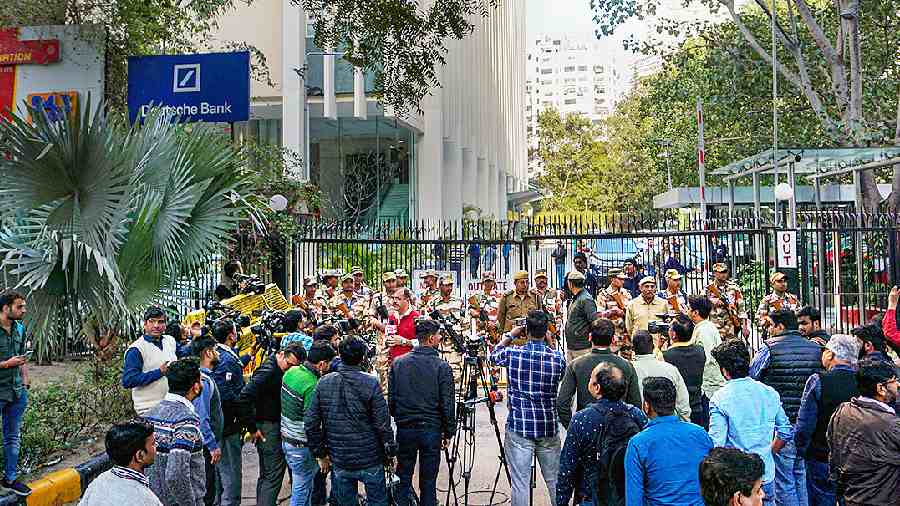The “surveys” by the income tax authorities on the BBC offices in Delhi and Mumbai have been condemned by The Times, London, while several other British newspapers and television stations have drawn attention to the documentary India: The Modi Question. The BBC says:
“The Income Tax Authorities remain at the BBC offices in New Delhi and Mumbai. Many staff have now left the building but some have been asked to remain and are continuing to cooperate with the ongoing enquiries.
“We are supporting our staff during this time and continue to hope to have this situation resolved as soon as possible.
“Our output and journalism continues as normal and we are committed to serving our audiences in India.”
Clips from the documentary were included on ITN’s News at Ten on Tuesday, with the presenter, Tom Bradby, introducing the report with the words: “The BBC’s operation in India looks to be paying the price for a documentary it showed here criticising Prime Minister Narendra Modi. Its offices in New Delhi and Mumbai have been raided — strangely perhaps — by tax officers. The phones and documents of BBC staff were confiscated. Mr Modi did manage to stop the documentary being shown in India but clips have appeared on social media.”
The report by Mark McQuillan begins with a voiceover from the documentary: “This series tells the story of Narendra Modi’s troubled relationship with India’s Muslims.”
In his report, McQuillan states: “This is the BBC documentary India’s authorities were desperate for their people not to see.”
After a line from former British foreign secretary Jack Straw asserting, “It is obviously a stain on his (Modi’s) reputation,” McQuillan continues: “It criticises the country’s Prime Minister Narendra Modi and his role in anti-Muslim riots. More than 1,000 were killed in Gujarat in 2002. And it’s alleged authorities allowed or even encouraged the violence — something Modi, who was chief minister of the state at the time has always denied.
“This morning at two of the BBCs offices in the country, a search was carried out by India’s Tax Department. At a press conference, a spokesperson for Modi’s party claimed the BBC has a tainted history of working with dislike and malice against India. But others argue today’s search is a ploy to intimidate and an undemocratic move in the world’s biggest democracy.”
Then the Congress spokesman Pawan Khera says: “He wants to control Meta, he wants to control WhatsApp, he wants to control Twitter. He wants to control the Indian media, we know the story. Now he also wants to control and intimidate foreign media. Why?”
McQuillan goes on: “The fallout has been going on for weeks. These were the chaotic scenes at Delhi University last month, police and security staff scuffling with students, they wanted to learn more about the documentary in question, but the authorities were determined to block them from watching it, much to their dismay.”
A Muslim student then comments that “if it is banned, then sure, there might be something important in it”. McQuillan adds: “Since Modi came to power in 2014, there have been consistent questions over his approach to the media.”
There is a voiceover from the documentary: “Could he have done more to prevent violence?” McQuillan concludes: “The BBC say their documentary was rigorously researched and want the matter resolved quickly but the fact they are one of a number of news organisations to be searched in recent years suggests this is a long-term issue in India.”
In a leader, The Times summed up its view: “With an assault on the corporation, Narendra Modi’s India strays yet further from democratic norms.”
The paper said: “As the largest democracy in the world, India is home to traditionally vigorous journalism. Yet an assault on the BBC, clearly orchestrated by the government of prime minister Narendra Modi, has shone a light on challenges faced by Indian media and the lengths to which anti-democratic forces will go to crush it.
“Last month, the first episode of India: The Modi Question was broadcast on BBC2. A documentary, it includes a previously unpublished report from the British foreign office that held Mr Modi ‘directly responsible for a climate of impunity’ that led to murderous riots during his time as chief minister of Gujarat....
“The film has not been broadcast in India. Yet, after clips began to circulate online, Mr Modi’s government exploited new laws to force YouTube and Twitter to remove them. Attempts to show it at Indian universities have also been stymied by riot police and mysterious outages of power and internet connectivity. This week, Indian tax authorities raided BBC offices in Delhi and Mumbai. Documents and phones were confiscated....
“Mr Modi is a Hindu nationalist and a populist. In power since 2014, he has been a poor custodian of India’s pluralism and democratic heritage. Numerous international bodies judge the country as less free under his leadership. Instinctively, many in the West still contrast India’s robust freedoms with the totalitarianism of China. It is both alarming and disappointing how keen he seems to be to prove them wrong.”










